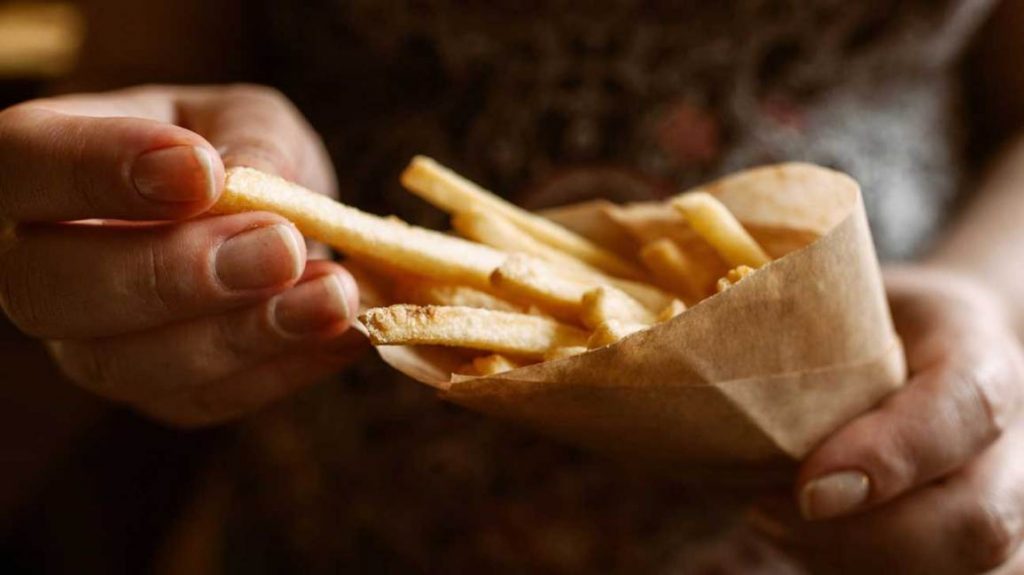At the point when Lay’s potato chips tested Americans with their trademark “betcha can’t eat only one!” during the 1960s, the organization was making a really sure thing. Potato chips, similar to pizza, dessert, and fries, make the rundown of the best 10 most “addictive” sustenances. We realize that specific highlights of these sustenances, such as being high in sugar and low in fiber—the sorts of nourishments that are intended to consume quick and taste great—trigger your cerebrum’s pleasure focus and make it hard to quit eating.
Be that as it may, when we state these nourishments are “addictive,” do we extremely would not joke about this? Will you actually be dependent on sustenance?
It’s a dubious inquiry among analysts. “Nourishment enslavement isn’t all around perceived by restorative experts, however there are singular specialists who accept, in light of their perspective of ebb and flow explore, that it is an idea that has utility,” says Chevese Turner, boss arrangement and procedure officer for the National Eating Disorder Association (NEDA).
In contrast to liquor abuse or dependence on opiates, you won’t discover sustenance compulsion in the Diagnostic and Statistical Manual of Mental Disorders. However, you will discover programs much the same as Alcoholics Anonymous that treat nourishment compulsion. In spite of the enslavement not being all around perceived in the therapeutic network, there are individuals out there endeavoring to “settle” it.
In contrast to liquor or opiate compulsion, however, attempting to get treatment for nourishment habit could be perilous. Dietary issue specialists stress that a treatment plan that asks assumed sustenance addicts to decline certain nourishments could support confused eating. What’s more, to be completely forthright, the “side effects” of sustenance compulsion, as per Food Addicts Anonymous, are somewhat sketchy. The site asks: “Have you attempted diverse eating regimens or health improvement plans, however none has worked for all time? Do you eat in private so nobody will see you? Do you maintain a strategic distance from social collaborations since you believe you don’t look adequate or don’t have the best possible fitting garments?”
It’s simple enough to envision pretty much any larger size individual who lives in the United States noting yes to these inquiries. “Individuals who have drafted themselves into the counter husky individual armed force feel good and supported in making a decision about hefty individuals’ nourishment decisions. Regardless of whether they are disgracing us for eating something that they don’t figure we ought to eat, or saluting us for eating something of which they favor, hefty individuals can wind up managing a wide range of unseemly cooperations including sustenance,” fat extremist, Ragen Chastain, wrote in her blog Dances With Fat.
We live in a culture that polices nourishment admission and disgraces and menaces individuals of a specific size. Does that imply that each larger size individual is really a sustenance someone who is addicted? Obviously not.
Different side effects recorded by Food Addicts Anonymous sound progressively genuine. “Have you gotten yourself heaving, utilizing intestinal medicines, diuretics, or practicing a ton to maintain a strategic distance from a load increase after you have eaten a ton?,” the site inquires. This sort of side effect absolutely indicates cluttered eating, if not sustenance dependence.
Maybe the nearest perceived dietary issue to sustenance habit is pigging out turmoil. Be that as it may, BED and sustenance compulsion are not a similar thing. “Sustenance enslavement is characterized as causing a distraction with nourishments that give extreme delight and dopamine expands like medications, liquor, shopping, betting,” Turner says. “While individuals with BED may gorge on very satisfactory sustenances, gorging is just a single piece of the practices related with the confusion and, subsequently, treatment is intricate.”
Regularly, individuals who gorge additionally take part in prohibitive practices like over-practicing and fasting, Turner says. Individuals who have BED additionally will in general have discouragement, tension, PTSD, or other temperament issue. While treatment for sustenance enslavement normally calls for staying away from white flour, sugar, and other purported “addictive” nourishments, treatment for BED is progressively included. BED treatment attempts to address hidden issues, including horrendous encounters and psychological wellness, and also decline the inclination to gorge and limit nourishment. “Self-perception and acknowledgment are a major piece of BED recuperation too,” Turner says.
In treatment for nourishment enslavement, limitation not just normally goes unaddressed, it’s supported, Turner says. While dietary problem specialists concur that a few sustenances are built to be as delectable and addictive as would be prudent (like those Lay’s potato chips), many stress that the idea of nourishment enslavement could be more unsafe than supportive.

